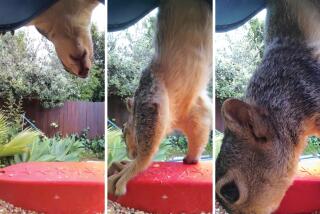Skunk Lovers Raising a Stink in Dana Point : County Plans to Trap, Kill Proliferating Varmints
- Share via
DANA POINT — Dana Point Harbor is known for its romantic sunsets, its streamlined boats and tranquil ocean breezes.
Lately, it’s also become famous, or infamous, for its skunks.
A veritable baby boom of the little stinkers has hit the harbor this summer. On any given night, dozens of the nocturnal animals can be seen waddling around the harbor’s restaurants, paths and parking lots, sniffing for food--and unwittingly sending joggers and diners running for cover.
“They’re all over the place,” said Dennis Winslow, assistant general manager of Michael’s Supper Club, one of the restaurants in the harbor. “There’s been times that I’ve had to wait 10 to 15 minutes just to get out of the parking lot at night, so I won’t run them over.”
The county, which owns the harbor, has come up with a solution. Prompted by a handful of complaints from nearby residents and restaurants, as well as the proliferation of skunk carcasses on the streets, the county now has hired a pest control firm to trap and euthanize the skunks within the next few weeks.
According to state law, the county is prohibited from relocating the skunks because they are recognized as animals that carry diseases, including rabies. Instead, they must be killed.
“We only have one choice,” said Patti Schooley, who operates the harbor for the county. “And it’s not an easy decision for us to make.”
The move has met with angry opposition from several residents and animal groups, who say that the skunk is a misunderstood creature that poses no safety threat to humans.
“It’s wrong, what they’re doing,” said Sue Walsh, one of many residents who regularly stroll along the harbor in the evenings. “These poor animals are immediately getting labeled as rabid, but that’s just not true. It would be different if there were rats running around rampant with disease, but that’s not our concern here.”
In an effort to halt the skunk extermination, the group will demonstrate from 1:30 to 5 p.m. today at the Henry Dana statue in the harbor.
“Our intent is to educate people, to stop this before it goes any further and have a dialogue with the county,” said Share Bond, founder of the recently formed SKUNKS, the Society of Kind Understanding for Not Killing Skunks, one of the groups organizing the demonstration. “It really boils down to this: The county doesn’t want to deal with an animal that sprays.”
Bond said skunks spray only when they are startled or defending their young, and are important to the balance of nature because they kill rodents, scorpions and insects. As for rabies, Bond said, most wild animals stay clear of skunks to avoid being sprayed, so the chances of encountering a rabid skunk are nearly nonexistent.
According to Mary Young of the Orange County Research Center, there hasn’t been a documented case of an Orange County resident contracting rabies from a wild animal since 1957, and it couldn’t be determined from the records whether that case involved a skunk.
Neither the county nor the state Department of Fish and Game would say exactly how skunks would be destroyed, although they did say it would be done in a humane manner. Animal Pest Management, the Chino-based firm the county has hired for nearly $5,000 to get rid of the skunks, was not available for comment.
“They could use other alternatives other than killing,” Bond said.
But Schooley said that the county has tried several tactics to get rid of the harbor skunks, which have proliferated because of the abundance of food in the area. One of the problems, she said, is the public’s affection for the feral cat colony in the harbor. People leave food for cats along the jogging path at night and that also attracts skunks. Dumpsters full of discarded food from harbor restaurants also draws the skunks.
“We’ve asked people to pick up their cat food before nightfall, we’ve requested that the garbage [in the harbor] be picked up before dark,” Schooley said. “We’ve done everything we can possibly do up to this point. You just can’t totally eliminate the food source.”
Barbara Miller, who has managed Delaney’s restaurant on the harbor for two years, said the establishment has been plagued with skunks for years.
“It’s definitely gotten worse this year,” Miller said, adding that it’s not unusual for customers to experience the unmistakable scent of skunk while eating their dinners. “It’s about time they got rid of them. We’d be a lot better off without them.”
But Dennis Winslow of Michael’s Supper Club said the skunks are a generally accepted part of life on the harbor, and that they have never hurt business at the restaurant.
“We get the occasional complaints about the skunks hanging out in front of the restaurant, but most people don’t mind,” Winslow said. “Do they need to exterminate them? Absolutely not.”
What everyone does agree on is that people need to realize that like all wild animals, skunks should never be tempted by open displays of food.
“The key is to not deliberately feed them and to not inadvertently feed them,” said Pat Moore, a spokesman for the Department of Fish and Game. “Bring your pet food in at night, clean up your garbage. If you remove the food source, they will stay away.”
More to Read
Sign up for Essential California
The most important California stories and recommendations in your inbox every morning.
You may occasionally receive promotional content from the Los Angeles Times.













